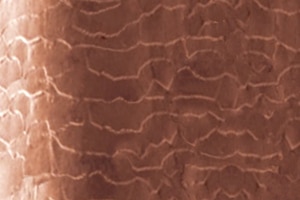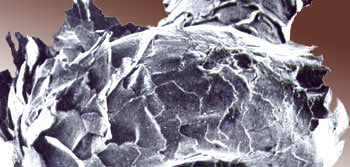Is your hair lacking in shine? It's dull and dry, and despite all the care you lavish on it, there doesn't seem to be any remedy that will restore its vigour, shine, suppleness and vitality?
Hair is not naturally dull or porous. There are many causes of dull hair. Understanding why hair becomes dull and porous will help you to know the right things to do, and which manipulations and habits to avoid. With our advice, you'll know how to take good care of your hair and how to give it the tone it's been missing.
CAUSES AND SYMPTOMS
WHY IS HAIR DULL?
The explanation may seem a little technical, but it's nonetheless essential if you want to know what to do to repair damaged hair.
In a few words, the cause of the problem is the more or less significant deterioration of the hair cuticle, the outer part of the hair keratin.
First, look at a hair in good condition under the electron microscope, in the photo on the left. It has a cuticle with smooth, tightly packed scales. This is what enables it to reflect light rays and shine naturally. In the photo on the right, the cuticle of this other hair shows marked detachment. The scales have lifted and no longer form the natural screen that should retain water (hydration) + care products inside the hair and protect it from external aggression. The irregularity of its surface prevents the mirror effect of light. The resulting hair is dull, rough, sad and lifeless.


WHY IS HAIR POROUS?
A rock is said to be porous (chalk, pumice, etc.) when it has an infinite number of small pores that make it permeable to moisture. By extension, porous hair is hair that is too hydrophilic. Again, its porosity is due to deterioration of the cuticle (the protective scales), which no longer acts as a natural barrier to the cortex. The more the cuticle is altered, or even destroyed, the more easily the keratin in the cortex "takes on water" and loses its compactness. Hair doesn't dry easily and forms frizz. It gets dirty more quickly and loses its shape in the slightest drizzle. It's hard to achieve beautiful curls when this happens! Another phenomenon is that it takes on and retains colour less well. In extreme cases, when the cuticle is completely destroyed, it becomes very difficult to dye.
Generally speaking, a distinction is made between 3 levels of porosity : slightly porous, normally porous, very porous.
How can you tell if your hair is porous?
1. Low porosity
The signs of weakly porous hair (hair whose scales are very tight) are as follows:
- Hair is difficult to wet (the scales are so tight that they slow down the penetration of water into the hair fibre).
- Hair dries very slowly (the water that has penetrated the hair fibre takes time to leave).
- Applying unsuitable oils will weigh it down.
2. Normal porosity
- Hair is smooth, supple and shiny, with well-defined curls and closed scales that allow just the right amount of moisture and care to pass through.
- Just one rule: look after it with natural hair care products that respect its nature, especially no silicone or other "enemy" products.
3. Very, very porous
The signs of very porous hair (hair whose scales are wide open, unlike hair with low porosity) are as follows:
- It looks dry and feel rough to the touch.
- It tends to tangle very easily.
- It reacts very visibly to a change in the weather (it increases in volume as soon as the weather becomes damp) and cause frizz.
As for the 'famous' porosity test known as the glass of water test, its reliability has never been demonstrated and it is more of a fun gadget than a serious reference tool.
Hair porosity is therefore determined solely by the position of the "scales" (the cuticle) that surround the hair to protect it.
Note: we are not born with naturally porous hair. There are many possible reasons for damage to the hair cuticle, all of which can add up. There are internal causes such as hypothyroidism or iron deficiency and then there are all the external causes linked to bad habits or aggressive cosmetic handling that weaken the cuticle, such as straightening or colouring and bleaching, etc. The same cause (damaged cuticle) therefore produces 2 harmful effects for the hair (lack of shine, porosity) but the good news is that a solution exists to treat dull, porous hair.
WHAT TO DO ABOUT DULL, POROUS HAIR: ADVICE AND SOLUTIONS
Of course, if you suffer from deficiencies,, anaemia or a thyroid dysfunction, the most urgent thing is to consult a doctor to receive the appropriate treatment. Depending on the case, medical treatment or simple vitamins or even rebalancing your diet will be sufficient.
If these internal factors are compounded by external factors, then follow our advice on how to combat lacklustre, porous hair with a natural treatment.
Damaged cuticles mean moisture problems.
Hair is too dry because it no longer retains the water and micro-nutrients it needs to be in top condition. The keratin barrier is fragmented, and the slightest care product "passes through" the hair: it's a vicious circle that needs to be stopped as quickly as possible.
Fortunately, solutions exist to repair and protect damaged hair fibre.
To sum up: 1 single cause, 2 effects, 1 single remedy: nourish and moisturise!
=> Avoid silicone-based products
Beware of false good ideas: sometimes the cure is worse than the disease.
Firstly, avoid all detangling products, shampoos and balms containing silicone or paraffin. Do these substances make them shine? Well, you should know that over time, they'll dull your hair even more! Don't overuse anti-dandruff or volumising shampoos either, as they all contain ingredients that will dull your hair's keratin over time.
A natural and effective remedy: every other time, you can shampoo your hair with an egg and a little rum. Lecithin, from which the egg is made, has the property of sucking up and retaining dust. The cane alcohol in the rum is antiseptic and tonic. After washing, rinse your hair thoroughly with warm water. Stop when your hair 'squeaks' under your fingers. Give your hair a final rinse with cold water and cider or lemon vinegar. Then, using a boar bristle brush, straighten your hair. These 2 tips will help close the scales of your hair's cuticle and give it shine.
=> Apply keratin-based hair masks
If your hair is very porous, apply a mask based on organic keratin (chitin), collagen and plant protein to strengthen it and make it less permeable to humidity (Crème Clauderer N° 25 for example). For dull, overly dry hair, choose a moisturising mask with a texture suited to your hair (Crème Clauderer or Baume Clauderer).
=> Caring for coloured hair
If you're going to colour your hair, make sure you only do the ends, so as not to increase the porosity of your hair. Here's a simple, natural remedy to make your hair shine: wet both hands with spring water and add a drop of olive oil (or more, depending on the nature of your hair). Then rub your hands together and apply to your hair.
TWO SPECIAL CASES
White hair and porosity

In general, grey hair is also more sensitive to humidity. But the cause of their porosity is different: hair whitening results from the disappearance of melanin pigments. This results in a void in the cortex and therefore a greater dispersion of the fibrils that make up keratin. The consistency of the hair can then change: it becomes larger in diameter, more fragile and more porous. The only remedy is to strengthen the fibre with a deep treatment as described above.
Porosity of afro or mixed-race hair
Treating frizzy hair well

La specific structure of this type of hair makes it particularly fragile. Dry by nature and more dehydrated than other hair types (see characteristics of frizzy hair), it generally has a high degree of porosity. To protect the keratin in frizzy hair from external aggressions (straightening, styling, climate, colours, unsuitable treatments, etc.), there's only one remedy: nourish and moisturise! Choose a natural treatment based on vegetable oils (shea, argan or jojoba, for example) and plant extracts to boost your hair's moisture levels.
Relaxed hair and porosity: be careful!

The very principle of straightening (frizzy/straightened hair) risks damaging not only the cuticle but also the fibres in the cortex, the inner part of the keratin. As a result, relaxed hair always tends to become dull and porous through "programmed denaturation". That's why the repair action here needs to be twofold. It is necessary to: 1° rebuild hair by providing sulphur proteins (which are the very constituents of keratin), chitin and collagen. 2° consolidate this repair with a complex of plant oils with high penetrating power, to penetrate to the very heart of the hair and nourish it deep down. These two actions are essential: if hair is rebuilt without nourishment, it risks breaking like glass at the slightest traction. If it is just oiled, without a simultaneous supply of proteins, it will become artificially greasy and remain dull and porous because its structure has not been restored.
To help you repair damaged frizzy hair, Clauderer has developed a range of natural care products with oils and plant extracts that deeply nourish the hair fibre. Nourished from the inside out, Afro or mixed-race hair, whether natural or relaxed, will quickly regain its beauty and shine thanks to a new, well-adapted hair care routine. Learn how to care for your frizzy hair => care for frizzy hair.
What are the 3 basic steps in a haircare routine adapted to the needs of frizzy hair not porous enough?
- Rinse your hair with hot water before applying a treatment. The heat will open the scales and allow the treatment to penetrate the hair fibre.
- Choose light oils (sweet almond, jojoba, olive, hazelnut, grapeseed or avocado oils).
- From time to time, use a clarifying shampoo. Ideally, add a teaspoon of baking soda to your usual shampoo. Baking soda is alkaline and will slightly open the scales of hair that is not very porous. Don't use too much to avoid drying out your hair.
What are the 3 fundamental steps in the haircare routine of very porous frizzy hair?
- Rinse your hair with cold water (heat in all its forms is an enemy of your hair) and if possible with acidic water. For example, dilute 2 tablespoons of vinegar in 1 litre of water and use this mixture to rinse your hair, which will help to "close the scales".
- Rich oils are ideal for nourishing them! We recommend castor oil or macadamia oil, for example.
- To keep your porous hair moisturised, you can smooth the scales by opting for treatments based on vegetable oils (coconut, argan, olive) and shea butter. These treatments will seal the cuticle of your hair.


Hello, I've come to see you because my hair has very low porosity, so to speak, and doesn't run at all, even in a glass of boiling water. I don't know what shampoo or care to give it any more. Everything stays on the surface. I use organic shampoos but nothing helps. They're either very dry or sticky. The scales are completely locked. My hair is straight, of medium thickness and without colouring. It's neither brittle nor split, but it dries from the inside out. Masks and care products, even organic aloe vera gel, are too acidic for my hair and dry it out. The oils don't penetrate and leave my hair greasy and sticky ...can you help me find a solution with care products adapted to my porosity problem? Best regards Estelle
Hello Madam, We can help you regain beautiful hair thanks to an adapted hair routine and natural products that respect the hair fibre. You can contact us to make an appointment in Paris or fill in the diagnosis request form on our website, under "I want a diagnosis". Yours faithfully The Clauderer Team